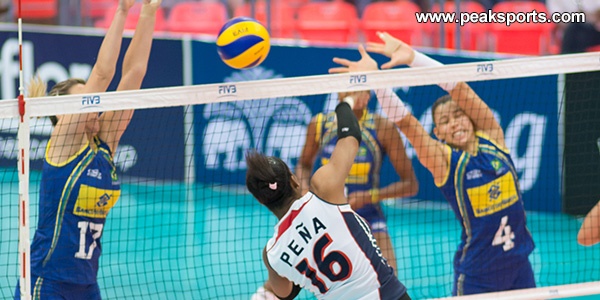Setting Process Goals Instead of Expectations
“I SHOULD serve every ball in.”
“I SHOULD pass every free ball to target.”
“I EXPECT to make good contact with each set.”
“I SHOULD play my game.”
“My coaches EXPECT me to play my game.”
These are all thoughts a volleyball player might have when approaching a match…
As a former collegiate volleyball player, there were certain things I expected of myself in every game.
I expected to get my feet to each ball in serve receive. I thought I should find a way to score with every set I got. I expected to get at least the first three serves in each time I went behind the service line.
However, just like you, I’m human and that’s not reality.
A ball is shanked or a serve is missed every now and then on the professional level. Even the best outsides don’t score on every set they attack.
I had these “SHOULD’S” about my performance… or rather high expectations, that would leave me frustrated with low confidence after a match.
I struggled to accomplish the fairly strict, unrealistic expectations I had for myself, and that would result in a lack of belief in my ability, or fragile confidence.
While these thoughts or expectations before a match can appear advantageous, like you’re working towards something, having expectations can actually often be detrimental to a volleyball player’s performance.
Think about it…
If you expect to pass a “3” ball every time in serve receive (which is difficult), and you don’t, what happens? You begin to question your ability and lose confidence in your performance.
Instead of having expectations going into a match, set process goals.
Many people wonder the difference in expectations and goals because they seem so similar.
Expectations are rigid rules you place on your performance, in which you wind up judging yourself subsequently.
Goals are something you continuously work towards that help you achieve something desired.
If you have an expectation such as, “I EXPECT to pass a ‘3’ each serve receive,” change that to a process goal like, “Platform to target.”
Expectations, or the “should’s” can have an adverse effect on your performance while playing volleyball.
As you prepare for your matches, use one or two process goals and put your expectations to rest.
Related Sports Psychology Articles
- Fear of Meeting Other’s Expectations and Pressure
- How to Develop a Champion Mindset in Volleyball
- Fragile Confidence and Perfectionism in Volleyball
*Subscribe to The Sports Psychology Podcast on iTunes
*Subscribe to The Sports Psychology Podcast on Spotify
Download a free sports psychology report to improve your mental game!
Learn more about our one-on-one mental game coaching.
The Mental Edge For Volleyball Players
Do you over think your performance in games? Do you lose confidence easily after a couple of blow plays? Do you become so frustrated with your game that you can’t focus on the next play?
If you answered yes to any of these questions, it’s a good bet that your mental game might prevent you from consistent performance in games…
“The Mental Edge For Volleyball” program is ideal for any club, academy, college, or professional volleyball players. In addition, volleyball coaches, instructors, and parents would also be wise to teach the strategies we provide in “The Mental Edge For Volleyball” to their players.


